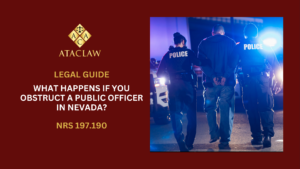Have you ever stopped to think about the potential legal ramifications of obstructing a public officer’s duties in Nevada? It’s not merely a matter of causing inconvenience or annoyance; it’s a serious legal issue addressed in NRS 197.190. This statute goes beyond simple etiquette, outlining the various ways in which hindering, deceiving, or withholding information from public officers can lead to legal consequences. At ATAC LAW, we recognize the importance of understanding the full scope of this statute. Join us as we explore its intricacies, unpacking its provisions to provide you with a comprehensive understanding of its implications and the potential repercussions for non-compliance.

What Actions Constitute Obstruction of a Public Officer in Nevada?
A “public officer” refers to any employee of the state or local government in Nevada, ranging from police officers and judges to council members and senators. NRS 197.190 outlines the offense of obstructing a public officer in Nevada, encompassing three specific actions:
1. Failure to provide information, or neglecting to do so, to a public officer when legally obligated.
2. Intentionally providing false information to a public officer.
3. Intentionally impeding a public officer from carrying out their official duties.
In essence, the law prohibits the obstruction of government officials in the performance of their duties. It’s important to note that refusing to disclose one’s name to a police officer typically does not constitute obstruction unless it impedes the officer’s ability to fulfill their duties.
What Penalties Await Those Charged with Obstructing a Public Officer?
In Nevada, obstructing a government officer is regarded as a misdemeanor offense, carrying significant penalties upon conviction. Individuals found guilty of this offense may face:
a. A maximum jail sentence of six (6) months, restricting their freedom and impacting their personal and professional lives.
b. Additionally, they may be subject to fines of up to $1,000, placing a financial burden on them and their families.
It’s important to note that these penalties can have long-lasting effects, affecting one’s reputation, employment opportunities, and overall well-being. However, for those facing their first offense, there’s a possibility of mitigating these consequences. In some cases, the judge may offer the opportunity for charge dismissal upon successful completion of the sentencing terms. This dismissal not only spares individuals from a conviction but also provides a chance to move forward without the stigma of a criminal record.
While violating NRS 197.190 usually isn’t considered a deportable offense, non-citizens facing criminal charges may still be at risk of deportation, especially given the volatile nature of immigration laws in today’s political climate.
Immigrants who find themselves charged with a crime are strongly advised to seek legal assistance from an attorney proficient in both immigration and criminal law. Such an attorney may have the ability to convince the District Attorney to dismiss the case or amend the charge to one that doesn’t carry deportation consequences.
What Are the Most Effective Defenses in an Obstruction of Government Officer Case?
The effectiveness of defenses in a Nevada “obstruction of a government officer” case hinges on the specific circumstances of the incident. Three common defense strategies include:
Your actions were lawful: Merely because a government officer perceives obstruction doesn’t necessarily mean it occurred. It’s plausible that the officer misunderstood your actions or had a misconception about what constitutes obstruction. If the prosecutor cannot substantiate that your actions amounted to obstruction, you aren’t criminally liable.
You were wrongly accused: There’s a possibility that the public officer, in a fit of frustration, falsely accused you. Alternatively, you may have been misidentified as the individual who actually committed the obstruction. If your defense attorney can demonstrate that you were unfairly targeted with false allegations, criminal charges should not hold.
Absence of willful intent: Providing misleading information to a government officer is only unlawful if you were aware it was misleading. If you genuinely believed the information you provided was truthful and accurate, then you haven’t violated NRS 197.190.
When is it possible to seal a criminal record?
If you’re convicted of “obstructing a government officer” in Nevada, you’ll need to wait for one (1) year before being eligible to seal your record. However, if your case is dismissed (indicating no conviction), you can pursue record sealing immediately. The process of sealing a criminal record in Nevada can be lengthy and intricate, and any misstep could result in setbacks lasting months. It’s essential to have experienced legal support by your side, and that’s why we’re here to help and ensure your path to record sealing is smooth and efficient.
For further legal assistance and to discuss your case with an expert, don’t hesitate to contact ATAC LAW.
